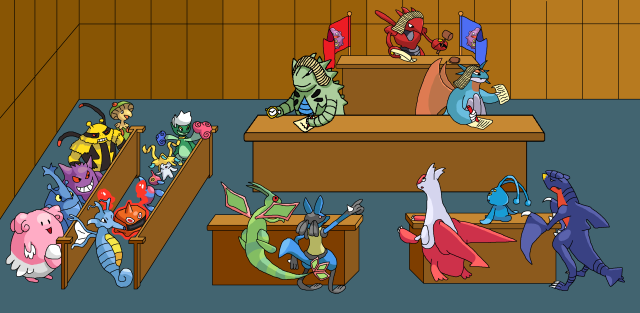Two weeks ago, there was an incident of cheating caught on stream and fully confessed to shortly thereafter. The week after that, there was an incident of cheating caught on another stream, but talked out of with a claim that it was an accident. And just this past weekend at the Latin American International Championships, a player was disqualified from top eight (of over 600 people!) for having a blatantly marked sleeve.
With all this publicly visible cheating and rule-breaking going on, players are naturally on edge. But since we here at HeyTrainer value being ahead of the curve, we will be focusing on those on-edge, nervous, neurotic people who are the natural extension of any system or game with tons of rules.
Yes: Today, I’m talking about rule sharks. What they are, what they do, why do they exist, and where competitive players should fall on the spectrum of “by the book” play vs. forgiving and cooperative.
1. What is rules sharking?
Meet Garchom P. Edelman, Attorney at Law:

Mr. Edelman is a Pokemon attorney, and he is really, really good at everything he does:

-So good he was banned from Smogon

-So good he won Worlds and dominated the format for a year

…And so good, he even Mega Evolved!
However, despite what you may think, Garchom P. Edelman is not a rules shark! Rather, he is a Pokemon attorney. He went to three years of law school, took the bar exam, and obtained tons of real-world experience because he cares deeply about the rules and the spirit behind them. And since Garchom P. Edelman cares about his clients, he's plenty willing to work out issues in a peaceful manner. So while he may look like a rule shark, and indeed follows the rules, he is a reasonable man that exercises good judgment in being both an ace attorney and a tier one, OU fiend.
A rules shark, on the other hand, insists that everything be played 100% by the book, in 100% perfect procedure, with the sort of unreasonable rigidity you would expect from only the most stressed out people. Ironically though, rules sharks are so rigid they forget that many of the floor rules and penalty guidelines are never 100% set in stone either. Thus, unlike Garchom P. Edelman the Pokemon attorney, rules sharks don't know how to handle situations with no clear-cut answers that well.
2. What are common ways people rule shark in the Pokemon TCG?
I’m not going to take too big a stance on whether it’s a good or bad thing to be a rules shark – merely that it’s better to be sophisticated in your application of the rules, like Mr. Edelman. That said, there are some things you’ll see more often than others from rule sharks.
Common methods of rule sharking in the Pokemon TCG include, but are not limited to:
-Always lobbying for a re-flip, especially when it would be advantageous to the rules shark.
-Demanding that all pre-game and in-game procedures be followed exactly as written. For example, when Professor Birch’s Observation is played, many players will screw up the order by flipping the coin before shuffling. It is by no means a bad thing to insist that someone follow the order, but the rules lawyer is surely going to escalate the situation, either by demanding a re-flip or even involving the judge. Likewise, don’t expect any sort of flexibility if you’ve charged your mind after starting to shuffle for a search.
-Asking for take-backs without ever permitting take-backs themselves. Or generally speaking, players who exploit the spirit of the game built into the floor rules, but never exercise it themselves.
-Players who throw a hissy-fit – in other words, players who get mad – over the violation of extremely minor rules. It’s tough to draw the line at what is a “minor” rule, and is an issue in itself we’ll discuss later in today’s entry, but basically anything that has virtually zero effect on the game. For example, whereas it’s always fair to insist that all of the cards in your opponent’s deck face the same direction, you’re overdoing it if you keep your opponent from drawing crying smiley faces in their notes when they prize three Rowlets.

Don't they look cute resting in the prizes?
-May overlap with outright misapplication of the rules. A disturbing number of players attempting to stall insist that they are allowed 15 seconds per every in-game action. This type of behavior has never been allowed, and the penalty guidelines flat-out presume that people making these claims are stalling, which is a bannable offense. Since an equally disturbing number of local judges are ignorant of the rules, or otherwise unwilling to look up the rules when questioned, many of these cheater/rule shark hybrids get away without any penalty at all. This is the darkest you usually get when it comes to rules sharks (although it’s better just to call them cheaters at this point).
3. Why do people shark rules in the Pokemon TCG?
We’ve established that rule sharks are all strict, inflexible people in their readings, applications, and in some cases misapplications of the rules. But why do they act this way? Rules sharks have drastically different motivations in a card game. A couple of these reasons are applicable to any game, but a couple are specifically applicable to the culture we’ve developed in Pokemon, for better or for worse:

-The most common motivation is defensiveness. As I said in the intro, demanding strict adherence to all rules is a natural reaction to sensationalist incidences of cheating. And considering how much cheating probably goes on below the radar, can you really blame them?
-Technically legal exploitation of procedure to gain an advantage. This is the true “gray area” of rules sharking that everyone seems to have a different opinion on, but the common philosophy here is the strictest form of “no takebacks.”
-Exploitation of procedure to gain an unfair advantage, or simply to cheat. Again, this steps beyond mere application of the rules because it’s an application of rules that don’t even exist. So say someone uses two Level Balls at the same time, gets a single Pokemon, starts shuffling, and then remembers their second search. It's a particularly scummy move of the other player to demand that the second search fails, as the double-search was an effort to speed up the pace of play in the first place. Thus, the player who was kindly speeding up their own pace of play will have to argue that procedure permits them to get two shuffles, thus mitigating the weak argument of the rules shark.
4. What is the ideal way to handle procedure in the Pokemon TCG?
We know what a rules “shark” is. We know why a rules shark does what it does. Now we need to find the ideal balance between applying the rules and maintaining integrity, such as our legal ace Garchom P. Edelman:
-Everyone without exception should know the rules of the game, floor rules, and penalty guidelines. Over 90% of nefarious rules sharking is impossible when you have actually read the rules, and it’s all available in your Pokemon Trainer Club account! Here’s a link to the actual rulebook.
Tl;dr – get educated
-The less experienced or privileged a player you are, the more you should insist that everything be done by the book. While skipping steps for things such as doing multiple searches for multiple Items is almost universally acceptable, you should take advantage of the judging staff whenever possible (and appropriate) if you’re a new player. While I know several players who believe that any question or dispute must always involve a judge, this should definitely be true if you’re either new to the game, visiting an area for the first time, or otherwise disadvantaged in some way relative to the other players.
Tl;dr –New players, go call a judge!
-Comply with your opponents’ reasonable requests. I believe that for an honest, experienced player who knows the rules to do well, mastering this balancing act can be quite useful. That’s because despite the fact that your game itself is a competition, actually executing the game with the least amount of stress possible is a cooperative task. Stress-free games are in turn valuable because your tournament performance expands across multiple matches, and you don’t want any emotional baggage from one match to carry over to the next…usually.
Consider the coin flip and the die roll. There are a lot of rules related to both of these, but as long as you meet requirements for both, then both are allowed. However, I can think of at least three issues off the top of my head:
a. What if my opponent doesn’t trust coin flips?
b. What if one of our coin goes into another playing area in a tight space?
c. What if for some reason the execution of my flips is bad that day and it keeps falling off the table?
Here, only scenario b has a bright line solution in the rules, and that’s only when your judge hasn’t declared an entire shared table as a shared playing area. In scenario a, you’re always allowed to use a regulation-appropriate coin no matter how your opponent feels about it; however, on the opening flip I always give my opponents the option to call the flip in the air so they can trust its result. Similarly in scenario c, if my flip keeps bouncing off the table, I eventually make an exception and just roll. In both scenarios a and c, I’ve carved out ways to de-pressurize the situation while not compromising my rights as a player.
What if your opponent is acting unreasonable? What if they demand you stop using a perfectly valid randomizer, or try to keep you from skipping steps where appropriate, such as executing multiple searches at the same time? It’s in these moments where you have to stand up for your rights and exercise your knowledge of the rules. For instance, coins and dice that meet all the regulations for play are allowed, and skipping certain steps without 50 shuffles is totally acceptable under the rules as part of the broader goal of maintaining a lively pace. It’s at this point where you have something incredible happen: despite being the one to rely on the fine print of the rules yourself, you are acting more like that noble legal champion Garchom P. Edelmen, while your opponent is being the rules shark!
Tl;dr – work with your opponent when appropriate; object when inappropriate.

"OBJECTION!!!"
Conclusion
We might not be talking about pure cheating for the third week in a row, but I hope this deeper look into another form of potentially maladaptive Pokemon player was insightful. It's tough to find a balance between spirit of the game and strict adherence to the rules, but it should be proof enough that procedure is important! And as surprising as it might be, mastering this balance helps make you a more relaxed, more enjoyable player to go up against, not to mention helps your overall tournament performance.
So remember, be less like a rules shark, and more like Garchom P. Edelman, the Atticus Finch of the Pokemon TCG legal world!

"You never really understand a person until you consider things from his point of view. Until you climb inside of his skin and walk around it…Although don't take that literally, because my claws are really, really sharp."
